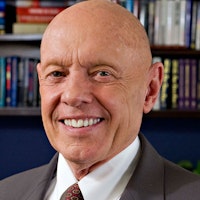You can only serve God as you serve other people, and you don’t feel the pulse of people unless you also feel the pulse of God, because you know that they are divine brothers and sisters to you.
Stephen R. Covey

Feel the Pulse of God
Topic: Love, Compassion, & Kindness
If you don’t feel the pulse of people, you can’t serve them and you can’t feel the pulse of God. You can only serve God as you serve other people, and you don’t feel the pulse of people unless you also feel the pulse of God, because you know that they are divine brothers and sisters to you.
Stephen R. Covey was born in Salt Lake City, Utah, on October 24, 1932, and he passed away on July 16, 2012. He was more than an educator and author; he was also a family man deeply rooted in his faith. Covey was a member of The Church of Jesus Christ of Latter-day Saints. His belief in God and universal principles significantly influenced his teachings and writings. Married to Sandra Merrill Covey for over 50 years, the couple had nine children. Covey's family life and faith were central to his understanding of leadership and personal effectiveness, themes he explored in books like "The 7 Habits of Highly Effective Families."
Covey was a professor at the Jon M. Huntsman School of Business at Utah State University at the time of his death. But he was best known for his book "The 7 Habits of Highly Effective People." This book was part of a broader collection of works that also includes titles like "First Things First," "Principle-Centered Leadership," and "The 8th Habit." These books weren't just about being effective in business; they were about how to live a balanced, meaningful life.
Stephen R. Covey left a lasting impression through his teachings and writings, but perhaps his most enduring legacy is the way he lived his life. He emphasized the importance of character, integrity, and ethical leadership. These were not just principles he talked about; they were principles he lived by. His lessons continue to influence people all over the world, encouraging them to lead lives that are not only effective but also grounded in good values.
Covey, Stephen R. “Interview with Stephen R. Covey.” Globaldharma.org, The Global Dharma Center (GDC), 27 June 2006, bit.ly/2Kt9sZv. [Spiritual-Based Leadership Research Programme].

Stephen R. Covey
Theme: Compassion

About This Stephen R. Covey Quotation [Commentary]
Stephen R. Covey begins with a straightforward test of service: “If you don’t feel the pulse of people, you can’t serve them.” He ties that human attentiveness to spiritual attentiveness: “you can’t feel the pulse of God.” In Covey’s sequence, the “pulse of people” and the “pulse of God” are not competing concerns; they belong together. Compassion, then, is not distant goodwill. It is learning to “feel the pulse of people” closely enough that real service becomes possible.
Covey makes the link explicit: “You can only serve God as you serve other people.” And he presses it further: “you don’t feel the pulse of people unless you also feel the pulse of God.” The point is relational and reverent at once. We serve with more care when we “know that they are divine brothers and sisters to you”—not as an idea, but as the way we meet each person in front of us.
In the larger passage, Stephen R. Covey applies this to leadership and daily work: “the top people have to be out in the field,” and they have to “get to know the people they affect and know their families and their situations.” He calls that presence “not a waste of time,” but “renewal,” part of “sharpening the saw”—to “continually renew ourselves physically, socially, emotionally, mentally, and spiritually.” He also names what supports this at scale: “structures… systems… policies and processes” that help people translate “strategic goals into their daily practice.” For Covey, service stays grounded in the same reality: if you do not “feel the pulse of people,” you cannot serve them—and you “can’t feel the pulse of God.”
Stephen Covey, Developing an Organisational Culture (Excerpt)
Give Service
Resources
Related Quotes
Copyright © 2017 – 2026 LuminaryQuotes.com About Us